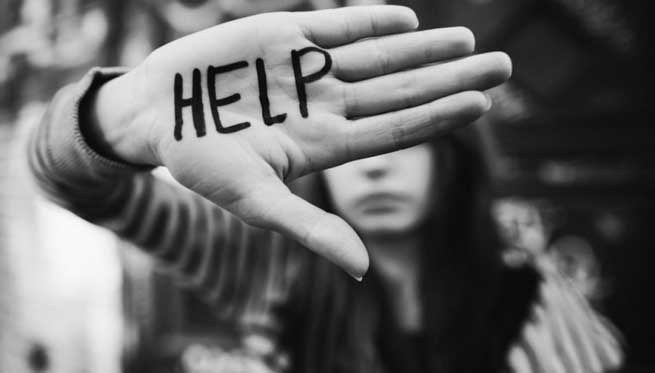In the event, if you have to report a mentally unstable person in your neighborhood. It is best to call law enforcement. If there are any weapons or violence involved, please call 911 immediately. The police will be able to take care of the situation and they’ll know what to do in order to keep you safe.
Contents
- 1 What Is Mental Instability?
- 2 Reporting a Mentally Unstable Person
- 3 Warning Signs To Report A Mentally Unstable Person
- 4 What To Do When You’re In Need Of Support?
- 5 Therapy For A Mentally Unstable Person
- 6 How To Help A Mentally Unstable Person?
- 7 What Best Describes The Person You Care About?
- 8 Conclusion
What Is Mental Instability?

Mental instability is a condition that affects an individual’s mood, thoughts, or behavior. It can be caused by a variety of factors, including stress, traumatic experiences, or mental illness. If you are concerned that someone you know may be unstable, it is important to know how to report them.
Reporting a Mentally Unstable Person
If you have a mentally unstable person in your neighborhood or around you. It is best to call law enforcement. If there are any weapons or violence involved, please call 911 immediately. The police will be able to take care of the situation and they’ll know what to do in order to keep you safe.
To report a mentally unstable person, contact an authority figure if possible. If this isn’t possible, then contact a trusted family member or friend who can get help from authorities on your behalf. Tell an authority figure exactly what is going on with the mentally unstable person, including specific examples of their behavior and how it makes you feel. A list of mental health resources for both children and adults can be found at the end of this article.
If there are any weapons involved with the mentally unstable person’s actions. Then it is likely that they will conduct a weapons check. The police may also detain the unstable person for psychiatric evaluation. If the individual threatens suicide, either verbally or through their actions. Ensure that they are taken to an emergency room immediately.
Warning Signs To Report A Mentally Unstable Person
As with most mental health conditions, there are warning signs that indicate whether or not a person may harm themselves, harm others, or pose an immediate threat to themselves and/or society. Some of these include:
- Talking about suicide or wanting to kill oneself
- Seeking out weapons such as guns, knives, pills, etc.
- Experiencing dramatic mood swings (e.g., going from extremely high energy one day and extremely low energy the next)
- Increased alcohol or drug use
- Talking about feeling trapped, being a burden to others, and/or being hopeless
- Withdrawing from friends and family
- Increased isolation
If you observe any of these warning signs in a friend, family member, or coworker, there are many things that you can do.
Examples of When You Should Call Law Enforcement or 911

Do not engage a mentally unstable person if they are violent, have access to weapons, or have threatened violence against others. If you fear for your life or the lives of anyone who could potentially get hurt, then report the mentally unstable person and call emergency services immediately. Some examples of when this is necessary include:
- The mentally unstable person has made any threats about harming themselves or others
- If there are warning signs that indicate they may be planning to harm themselves
- If there are warning signs that indicate they may harm someone else
- You believe that they pose an immediate threat to society
- Contact Information for Law Enforcement and Emergency Services in Your Area
You can find contact information for both law enforcement and emergency services in your area by going to the National Emergency Numbers Association’s website.
What To Do When You’re In Need Of Support?
If you are in need of support, but not in crisis. There are a few things you can do to get help. First, talk to someone you trust about what you’re going through. This could be a friend, family member, or therapist.
- If you don’t feel comfortable talking to someone you know, try reaching out to a helpline or support group. You can find these services listed at the end of this article.
- Finally, if your mental health is really taking a toll on you and those around you, consider seeking professional help from a therapist. In order to find one in your area, go to Psychology Today’s Therapist Finder.
- You can also reach out to national organizations that offer support and resources for people struggling with mental illness. Some of these organizations are listed below.
Helplines
National Suicide Prevention Lifeline: The National Suicide Prevention Lifeline is a network of local crisis centers that provides free and confidential emotional support to people in suicidal crisis or emotional distress 24 hours a day, 7 days a week. You can contact the National Suicide Prevention Lifeline by calling 1-800-273-TALK (8255) or through their chat line available on their website at suicidepreventionlifeline.org.
Crisis Text Line: The Crisis Text Line is a service that provides free, 24/7 support and information via the medium of text messaging to individuals in crisis. To get help from the Crisis Text Line, you can text HOME to 741741 from anywhere in the US, anytime, about any type of crisis. For more information about Crisis Text Line, visit their website at crisistextline.org.
National Alliance on Mental Illness (NAMI) Helpline: The NAMI Helpline is a free service that provides support and information to individuals living with mental illness and their family members. You can contact the Helpline by calling 1-800-950-6264 Monday through Friday from 10 am to 6 pm or online during those hours at nami.org/Helpline.
Therapy For A Mentally Unstable Person

Cognitive-behavioral therapy is a type of psychotherapy that focuses on how our thoughts, feelings, and behaviors are interrelated. Applied to a person in crisis, the premise of cognitive-behavioral therapy is that mental illness can be treated by changing behavior.
Psychiatrists will often use medications in addition to cognitive-behavioral therapy in order to treat a patient with mental illness.
There are many reasons why someone may have a mental health condition. Traumatic events, such as the death of a loved one or abuse in childhood, can lead someone to experience symptoms of depression or anxiety. Factors such as stress from work or home life, genetics, and drug use may also be at play.
If you believe that someone is in crisis, call 911 or go to the nearest emergency room. If you suspect that a person may pose an immediate threat to society, involve law enforcement and/or emergency services as soon as possible.
How To Help A Mentally Unstable Person?

There are many ways you can help a mentally unstable person. If you are thinking to report a mentally unstable person, then first try helping them. Here is how you can do it-
Be Direct
Talk to the person directly about what they’re going through and how they’re feeling. Don’t be afraid to admit that you care for their well-being. For example: “I’ve noticed that lately you’ve been really down and it’s got me worried.”
Be Caring
Make sure your tone is caring rather than confrontational. Avoid blaming them for feeling the way they do. For example, don’t say “You should stop doing drugs.” Say instead “I’m concerned about you and how you’re feeling. I want to help however I can, so let’s figure out together what we can do differently.”
Be There For Them
Let them know that they are not alone. Even if the person with mental illness doesn’t feel like it will get better, remind them that other people have experienced these types of things before and come through stronger than ever.
Find Support Groups
Find trusted support groups or other outlets where the person can meet others who are experiencing similar struggles. This could be a support group for individuals living with depression or anxiety, or another venue such as art therapy classes or writing workshops.
If possible, keep the person in your life involved in social activities. Even if it means meeting up with them after work for coffee rather than staying home in isolation. These small steps can go a long way to helping someone feel like they’re not alone and that there’s still hope for the future.
Don’t Take Things Personally
Don’t take their behavior personally. Just because someone is having a bad day or even using drugs around you doesn’t mean that they don’t care about or trust you anymore. Mental illness can get in the way of seeing things clearly. Even when we know better intellectually.
Seek Professional Help
If you see any signs of suicidal thoughts, make sure to tell someone. It may help if this person knows that you are concerned and want to help. Don’t be afraid to seek professional help if the person’s symptoms persist or become concerning. There are many mental health professionals who are skilled at helping individuals overcome depression, anxiety, substance abuse problems, and other struggles. They can offer guidance for how to talk about what you’re experiencing with the person in crisis as well as strategies for managing your own stress levels during this difficult time.
“When people are suicidal or struggling with a mental illness, they often know that they need help but may not take action on their own behalf.”
What Best Describes The Person You Care About?
The individual I’m close to right now doesn’t have any problems, but they do want to stay mentally healthy. what you can do in such a case-
- Let the person know that you care about them and their happiness.
- “One of the most important parts of caring for someone close to you is simply letting them know that you’re there.”
- Avoiding making assumptions can go a long way toward improving your relationship with this person, as it helps to show that you respect them as an individual who has their own thoughts, feelings, desires, hopes, etc.
- If you suspect that a friend or family member with a mental illness might be in danger of hurting themselves, make sure to let someone know. This could be anyone from their therapist to another wellness professional if they are close enough to you. It’s okay for you not to take on the responsibility alone or to shoulder this burden yourself. If you aren’t able to speak up because of your relationship with this individual. It might help if there are other people around who can share any concerns they have as well.
When They Don’t Want Others To Know About Their Mental Illness

It may be hard to maintain the integrity of trust between yourself and this person if you feel like they have kept information from you or are not being open. Ultimately everyone needs support at some point in time, and your loved one may be no different.
- “Not everyone is going to feel comfortable with opening up about what they’re going through, even to those who care the most about them.”
- If possible, try to keep the person in your life engaged with social activities. Even if it means meeting up with them after work for coffee rather than staying home in isolation. These small steps can go a long way to helping someone feel like they’re not alone and that there’s still hope for the future.
- “When people are suicidal or struggling with a mental illness. They often know that they need help but may not take action on their own behalf.”
- “If you see any signs of suicidal thoughts, make sure to tell someone. It may help if this person knows that you are concerned and want to help.”
- Don’t be afraid to seek professional help if the person’s symptoms persist or become concerning. There are many mental health professionals who are skilled at helping individuals. Overcome depression, anxiety, substance abuse problems, and other struggles. They can offer guidance for how to talk about what you’re experiencing with the person in crisis. As well as strategies for managing your own stress levels during this difficult time.
- “When people are suicidal or struggling with a mental illness. They often know that they need help but may not take action on their own behalf.”
- That doesn’t mean you “enable” them by doing things for them that they could do themselves. It simply means that sometimes life is harder than we expect it will be. And we need support when dealing with obstacles that might seem insurmountable (especially when something like depression is involved).
- “Not everyone is going to feel comfortable with opening up about what they’re going through, even to those who care the most about them.”
Conclusion
Mental illness is a serious issue that affects many people in the world. There are several ways to report a mentally unstable person. One way is by calling 911 and reporting it anonymously. If you cannot speak with them directly or do not feel safe doing so. This will allow the police officers access to their medical records. That may provide important information about his/their mental health history. And current medications being taken for treatment of symptoms such as delusions, hallucinations, suicidal ideation, homicidal thoughts, etc. Another option would be contacting your local crisis line center. Who can then coordinate an appropriate response from law enforcement officials when they arrive on site. Lastly, another way to contact authorities about someone’s mental state is through Adult Protective Services (APS). If you or someone you know is dealing with mental health issues.
If you are looking for affordable Online Counseling MantraCare can help: Book a trial therapy session


